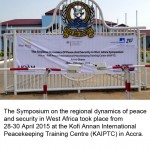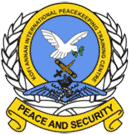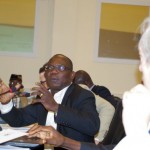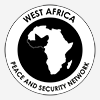‘Sahelian Security in Flux’
Monday 13th May 2019. This workshop was held at Chatham House, London and co-organised by the West Africa Peace and Security Network, University of Portsmouth and Chatham House. The programme of the event is available here. A report is available on our Reports page.
WAPSN Workshop 2018, Portsmouth, UK,17th-18th of May 2018
The West Africa Peace and Security Network’s annual workshop “New Thinking on West African Security Challenges” was held at the University of Portsmouth on the 17th-18th of May 2018. The workshop discussed new approaches on security challenges in West Africa including highly relevant topics such as the role of foreign powers for West African peace and security; the AU and ECOWAS’ approaches to address peace and security on the continent; non-state actors, violent extremism, security and knowledge production in West Africa. Participants included academics and experts from West Africa, the UK and Europe. For more details, please see the workshop programme.
You can view the report on this event on our Reports page
WAPSN Symposium 2018, Bamako, Mali, 4-5th of May 2018
The West Africa Peace and Security Network (WAPSN) organised its fourth annual symposium in Bamako, Mali on 4-5 May 2018 at the Ecole de Maintien de la Paix (The Peacekeeping School). This event aimed to create the space, time and opportunity for the free exchanges of ideas, scientific cooperation and practical interaction between policy and academic worlds. Each year highly topical issues are chosen to foster this exchange of ideas and provide a series of policy-relevant insights on peace and security in West Africa.
Participants included academics and experts, mostly from West Africa, the UK, continental Europe and Canada. Participants also included practitioners from a variety of organisations such as: civil society organisations (e.g. the West African Network for Peacebuilding (WANEP), diplomatic services, armed forces and regional and international organisations (e.g. ECOWAS, the UN, the EU), and research and training institutes (e.g. the Legon Centre for International Affairs and Diplomacy (LECIAD) and the Institute for Peace and Strategic Studies (IPSS), University of Ibadan, Nigeria.
For more details, please see the symposium programme.
You can view the report on this event on our Reports page
The BISA research workshop ‘Security theory, expertise and practice: past experiences and new approaches to collaboration’ was held at BISA in Bath on 12th June 2018, and was sponsored by the West African Peace and Security Network. The workshop was co-organised by Philipp Lottholz and Elisa Lopez Lucia (member of the WAPSN steering committee). It brought together researchers and policy-practitioners to discuss the conditions of collaboration, and the connections between scholarly knowledge production on the one hand, and security expertise, policy-making and practices on the other hand. Workshop discussions focused in particular on two geographic areas: West African and Central Asia.
The key conclusions of the workshop are summarised in a blog post available here: https://securitypraxis.
WAPSN Workshop 2017: Tackling Security Challenges in West Africa
29th (13.00, opening speech) – 30th (10:30) June, 2017
Portland Building 1.67, University of Portsmouth
Full programme available here
————————————————
30th June: PhD Workshop
‘Jihad in West Africa and the Rise of Boko Haram’
Speakers:
Michael Nwankpa, University of Roehampton
Confidence Uwazuruik, University of Bournemouth
Fernan Osorno, University of Bristol
———————————————-
Date/Time: 29th June (12:00) – 30th June (9:00)
Place: Portland Building (1.67), University of Portsmouth.
Peace Support Operations in West Africa, Opérations de Maintien de la Paix en Afrique de l’Ouest.
 2nd Annual Symposium of the West Africa Peace and Security Network (WAPSN)
2nd Annual Symposium of the West Africa Peace and Security Network (WAPSN)
2éme Symposium Annuel du Réseau sur la Paix et la Sécurité en Afrique de l’Ouest (RPSAO, WAPSN)
__________ in English
Peace Support Operations in West Africa
The term peace support operation (PSO) is widely used by many civilian agencies to describe their activities in conflict or post-conflict situations, notably in the context of peacebuilding projects and humanitarian relief efforts. Military organizations also use the term PSO to describe a variety of military activities that are distinguished from regular military operations. NATO’s PSO doctrine, for instance, once distributed to African armies, defines PSO as impartially conducted operations, normally in support of an internationally recognized organization like the United Nations. Multifunctional operations are designed to create a secure environment and to facilitate the efforts of the civilian elements of the mission to create the conditions for peace. PSOs may include peacekeeping and peace enforcement, as well as conflict prevention, peacemaking, peacebuilding and humanitarian operations. Outside of military circles, the term peacekeeping is often used to embrace all types of PSOs.
According to several practitioners, academics and military doctrines, what makes PSOs distinct is their impartial nature. PSOs are neither in support of, nor against a particular party, but are conducted in an impartial and even-handed manner. Emphasis is put on the mandate which should not designate an enemy or seek military victory.
Yet, the impartiality (and efficacy) of PSOs is called into question in the context of operations that have blurred the lines between peacekeeping, war fighting, counterinsurgency, counterterrorism, peacebuilding, statebuilding and humanitarian actions. Mixing and muddling civilian, humanitarian, military and warlike objectives in the same mandate can result—and has resulted—in policy incoherence, in local resistance to international forces, and in unachievable political solutions to conflict.
The case of the UN and French intervention in Mali has certainly highlighted the difficulties arising from such blurred lines, as the 2015 Report of the High-Level Independent Panel on United Nations Peace Operations argued. Most notably, the distinction between UN-led peacekeeping and French-led counterterrorism operations is arduous and compounded by the difficulties in distinguishing the ‘terrorists’ from the legitimate political actors. Moreover, the peace support operations in Mali are intertwined with the regional counterterrorism efforts of the G5 Sahel. The latter is not only supported by the French government and military, but its members are troop contributing countries to MINUSMA: Burkina Faso contributes 892 personnel, Chad 1,092, Mauritania 6, and Niger 868 (as of 31 January 2015; Mali being the fifth member of the G5 Sahel).
The case of Mali is only one example. The conflicts in Sierra Leone and Liberia in the 1990s also exposed how regional, political, and ‘warlordism’ dynamics challenged the (often binary) conceptual frameworks underpinning policies of peace intervention. Such examples expose the various political, strategic, and practical challenges facing civilian and military actors involved in peace support operations and raises a number of theoretical, conceptual and normative issues that question the claims to impartiality.
__________________ en français
Opérations de paix en Afrique de l’Ouest
Le terme « opération de paix » (OP) est largement utilisé par les acteurs civils pour décrire leurs activités en situation de conflit ou post-conflit, notamment dans le contexte de projets de réconciliation et d’efforts à l’aide humanitaire. Les organisations militaires utilisent aussi le terme pour décrire une variété d’activités militaires qui se distinguent des opérations militaires dites « normales » ou « traditionnelles ». La doctrine OP de l’OTAN, par exemple, qui a été distribuée aux armées africaines au début des années 2000, définit les OP comme des opérations impartiales, normalement en appui à une organisation reconnue internationalement comme les Nations unies. Les opérations multifonctionnelles sont conçues afin de créer un environnement sécuritaire et afin de faciliter les efforts des éléments civils de la mission. Le concept OP peut être déployé pour inclure le maintien de la paix, l’imposition de la paix aussi bien que la prévention de conflits, le rétablissement de la paix, la réconciliation et les opérations humanitaires. Hors des cercles militaires, le terme « opération de paix » est souvent utilisé pour inclure tous les types d’OP.
Selon plusieurs chercheurs, praticiens et documents de doctrine militaire, les OP se distinguent de par leur neutralité. Les OP ne doivent ni appuyer, ni s’opposer, à un groupe particulier, mais être conduites de manière neutre et impartiale. L’accent est mis sur le mandat, qui ne doit pas désigner un ennemi ou rechercher la victoire militaire.
Pourtant, la neutralité et parfois l’efficacité ou l’utilité des OP sont remis en question dans le contexte d’opérations où les frontières sont incertaines entre le maintien de la paix, les opérations de guerre, les opérations de contre-terrorisme et de contre-insurrection, la construction de l’État et les actions humanitaires. Le mélange des objectifs civils, humanitaires, militaires et autres dans le même mandat peut occasionner (et a déjà causé) des incohérences politiques, des mouvements ou actions de résistance locale et des obstacles à la recherche de solutions politiques au conflit.
Le cas de l’intervention de l’ONU et de la France au Mali a certainement mis en relief les difficultés résultantes de ces lignes floues, comme le rapport 2015 du Groupe d’étude sur les opérations de maintien de la paix de l’ONU a remarqué. En premier lieu, la distinction entre le maintien de la paix mené par l’ONU et le contre-terrorisme mené par la France est, en pratique, difficile sinon impossible à mettre en œuvre et illustre bien les difficultés et conséquences de distinguer les ‘terroristes’ des acteurs politiques légitimes. De plus, les opérations de paix au Mali sont entrelacées avec les efforts de contre-terrorisme régionaux du G5 Sahel. Ce dernier n’est pas seulement soutenu par le gouvernement et l’appareil militaire français. Ses membres constituent une partie non négligeable des troupes de la MINUSMA : le Burkina Faso contribue 892 personnels, le Chad 1 092, la Mauritanie 6 et le Niger 868 (en date du 31 janvier 2015, le cinquième membre du G5 Sahel est le Mali).
Le cas du Mali est un exemple parmi d’autres. Les conflits des années 1990 au Sierra Leone et au Libéria ont également illustré comment les dynamiques régionales (i.e. interventions régionales, économie politique de guerre menée par les seigneurs de guerre, etc.) exposent les limites du cadre national (étato-centrique) des opérations de paix (onusiennes notamment). De tels exemples démontrent bien les nombreux défis politiques, stratégiques et pratiques auxquels font face les acteurs civils et militaires impliqués dans les opérations de paix, soulevant également un nombre significatif de problèmes théoriques, conceptuels et normatifs.
WAPSN/FrancoPaix Conference May 4th and 5th 2017, Montréal.
Programme:
Programme Colloque FrancoPaix_WAPSN
The 2017 WAPSN Symposium: Montreal
The WAPSN symposium 2017 focused principally on the theme of: ‘Back to the Future? Conflict Resolution and Sustainable Peace in Contemporary West Africa.’ A plethora of literature exists on the violent conflicts in West Africa and how they are managed most especially through peacekeeping missions. On the other hand, scant attention is given to the study of how the root causes of the extremist violence in the region are addressed or can be removed through conflict resolution mechanisms. The 2017 WAPSN Symposium sought to address this existing lacuna through our knowledge system in a manner that makes a contribution to the attainment of the global Sustainable Development Goals (SDGs) in West Africa.
The goal of conflict management is to control the spiral of a conflict in a manner that reduces its damaging effects. In this case, the conflict is assumed to be a terminal problem that is easier to manage than solve. Taking this into consideration, peacekeepers (whether along the Chapters 6, 7 or 8 trajectories) focus more of their energies on calming the conflict situations and limiting casualties, with the result that exit strategies for peacekeeping missions are often based on noticeable reduction in violence. It is one thing for the violence associated with a conflict to be terminated and it is another for the root causes of the conflict to be removed. The end of physical hostility between belligerents does not also suggest that the psychological damage done to the fabric of the society by the violent encounters has been resolved. Hence, in many post conflict societies in West Africa today, people still refer to the past. The Nigerian civil war was fought from 1967 to 1970. Some Igbo people are still nursing the “Biafran” agenda of exiting from Nigeria. Many lives have been lost in 2016 for this. The militant youth in the oil-rich Niger Delta region of Nigeria are back to the creeks blowing up oil pipelines. A lot is spent on defeating Boko Haram in Nigeria but there is little commitment to addressing the core issues that brought the insurgents into being. It may be recalled that there were many phases in the Liberian crisis. One phase ends and another starts later. This is largely because the core issues in the conflict were not addressed. The country has consistently found it difficult to experience any political stability. The violence in Mali might have abated but the conflict issues are yet to be resolved.
By focusing on “conflict resolution” the WAPSN 2017 symposium sought to reclaim the knowledge of the salient issues that have to be addressed in order for these violent conflicts to be better dealt with. It addressed questions such as ‘what can we learn from past experiences?’ And ‘what are the futures of conflict resolution as a normative project, as a research programme, and/or as a practice for building peace?’
The 2015 WAPSN Symposium: Accra
I n April 2015, the WAPSN organized a symposium on the Regional Dynamics of Peace and Security in West Africa at the Kofi Annan International Peacekeeping Centre in Accra. The event brought together researchers and practitioners from Africa, Europe and North America to discuss current challenges to peace and security in West Africa. Among others, the Vice President of the ECOWAS Commission, H.E. Dr. Toga Gayewea McIntosh, the Political Director of the ECOWAS Commission and UN representatives were in attendance. Debate focused on the crisis in Mali, the MINUSMA operation, maritime security in the Gulf of Guinea, the role of France in West Africa and on the coordination of different organizations in conflict resolution.
n April 2015, the WAPSN organized a symposium on the Regional Dynamics of Peace and Security in West Africa at the Kofi Annan International Peacekeeping Centre in Accra. The event brought together researchers and practitioners from Africa, Europe and North America to discuss current challenges to peace and security in West Africa. Among others, the Vice President of the ECOWAS Commission, H.E. Dr. Toga Gayewea McIntosh, the Political Director of the ECOWAS Commission and UN representatives were in attendance. Debate focused on the crisis in Mali, the MINUSMA operation, maritime security in the Gulf of Guinea, the role of France in West Africa and on the coordination of different organizations in conflict resolution.
 “The prevention of conflicts requires their deeper understanding. Therefore, a better communication and cooperation between practitioners from regional and international institutions, civil servants from national governments and researchers is needed to strengthen this understanding and use it in an effective way”.
“The prevention of conflicts requires their deeper understanding. Therefore, a better communication and cooperation between practitioners from regional and international institutions, civil servants from national governments and researchers is needed to strengthen this understanding and use it in an effective way”.
The Political Director of the UN-Office at the African Union, Dr. Abdel-Fatau Musah, taking part in discussion with academics from the West Africa Peace and Security Network.
